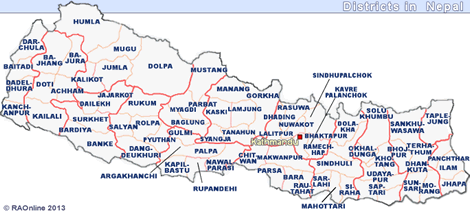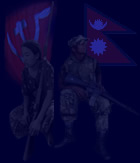|
Reports
on Nepal's Civil War
|
   
|
Community
service in Maoist areas
|
September
2005
| Defying
Maoist threats and official indifference |
Fear
does not seem to move 85-year old Ram Bahadur Rai anymore. "We're just
too exhausted. There is nothing we can say to make them leave us alone,"
he fumes, referring to the Maoists.
As
the oldest member of Yafu village, five hours from Khandbari, Ram Bahadur
tries to convince the young people to focus on developing their village
instead of running away. "Who's left to take care of our village?" he asks.
But
Yafu (pictured) has become a beacon of hope in these lush green hills of
eastern Nepal because despite fear of Maoists, every household is involved
in community service. Fifty villagers contributed Rs 200,000 and their
labour to complete an irrigation canal with support from the British aid
ministry DfID and technical help from the NGO Rural Reconstruction Nepal.
 |
Full
story ... |
August
2005
| Citizens
are increasingly vocal in calling for peace and demcocracy |
Thousands
attended the huge sit-in for peace and democracy on Tuesday afternoon that
filled up Basantapur.
The
square was festooned with banners, placards and even cartoons. Poets, writers
and academics spoke and there was even a 12-minute silence to mourn those
who have died in the past nine years of conflict. On stage, women held
36 peace lanterns "to show the way back to democracy" and others dressed
as widows sat cross-legged amidst a performance depicting grief and bereavement.
 |
Full
story ... |
|
Kathmandu
to Kakarbitta and back
|
August
2005
| Far
eastern economic recovery hinges on the highways ... |
No
Maoist was waving a party flag, no landmines were going off, no militants
surfaced to wave assault rifles at travellers. The deserted look of the
600-km stretch of highway from Kathmandu to Kakarbitta is a sign that Maoist
fear has taken its toll but highway travel is not as treacherous as it
is made out to be.
Because
of curfews along the way, night buses have stopped services and instead
ply only in daytime. Up until the dusty eastern border town of Kakarbitta
recent visitors counted hardly 20 long-range buses.
'Rumours
and speculations spread unnecessary fear. People from Kathmandu should
be told not to believe everything they hear about how dangerous road travel
is,' says Hari Lama, a truck driver, as he helps right a bus that went
off the road.
Many
drivers and residents along the highway believe that rumours, rather than
actual Maoist attacks, are responsible for the empty highway. 'Such fear
is natural but does this mean we totally stop using the roads altogether?'
asks Lama.
 |
Full
story ... |
|
Dailekh:
Helpless and hopeless
|
July
2005
| Eight
months after their uprising, the women of Dailekh ... |
For
those living in Kathmandu Valley the rest of the country may as well be
on another planet. All they care about is that things are ok inside the
Ring Road since February First.
There
may be an indefinite banda in Doti, all schools may be closed in Kailali,
healthposts in Bajura may be without medicine, there may be a food shortage
in Humla. But who cares? The people of western Nepal stopped expecting
anything from Kathmandu long ago.
The
women in Dailekh defiantly stood up against the Maoists when the rebels
stopped them from celebrating Dasain and tried to recruit their children.
But when the rebels hunted down six members of a family they thought were
ringleaders of the Dullu resistance, the other villagers fled in panic
with nothing but the clothes on their backs.
 |
Full
story ... |
July
2005
| Nima
Dorje Lama was lucky he survived, ... |
Nima
Dorje Lama was in bed when a security patrol banged on his door in Ryale
of Kabhre district on the night of 4 November 2003.
Thinking
they could be Maoists, he didn't go to open the door right away. When he
did, the soldiers arrested him on suspicion of being a Maoist. They found
a pressure cooker in his kitchen and some wires. That was all the evidence
they needed.
Lama,
38, was taken to a security camp in Malpi and Rosi Khola and then to Singha
Nath Gan in Bhaktapur. He was stripped naked and beaten mercilessly. He
was ordered to admit that he had a role in the murder of the Ryale VDC
Chairman Krishna Prasad Sapkota three years ago. "They put a gun to my
head, stood me before a hole in the ground and told me to admit that I
had committed Sapkota's murder,' he recalls. Both his ankles were severely
injured as a result of the torture and Nima Dorje was taken to the Birendra
Sainik Hospital in Chhauni where he spent 45 days recuperating.
 |
Full
story ... |
|
Tough
questions for Nepal's Maoists
|
June
2005
| Have
Nepal's Maoist rebels lost their way? |
They
have staged two widely condemned attacks on civilians in buses, there has
been a public split in their ranks and their wooing of mainstream parties
has largely gone unheeded.
Kanak
Dixit, publisher of Himal magazine, was in the southern district of Chitwan
hours after a bus landmine there killed nearly 40 people last week - in
Dixit's words, "mass murder".
"Despite
the Maoists' reasonable social agenda," he says, "this focuses the mind
on their atrocities."
"They
increasingly rely on brutal methods of control: hitherto, one-on-one attacks
and mutilations, and now this."
Near
him under a mat was the headless body of an eight-year-old boy unearthed
from the sand.
 |
Full
story ... |


|



